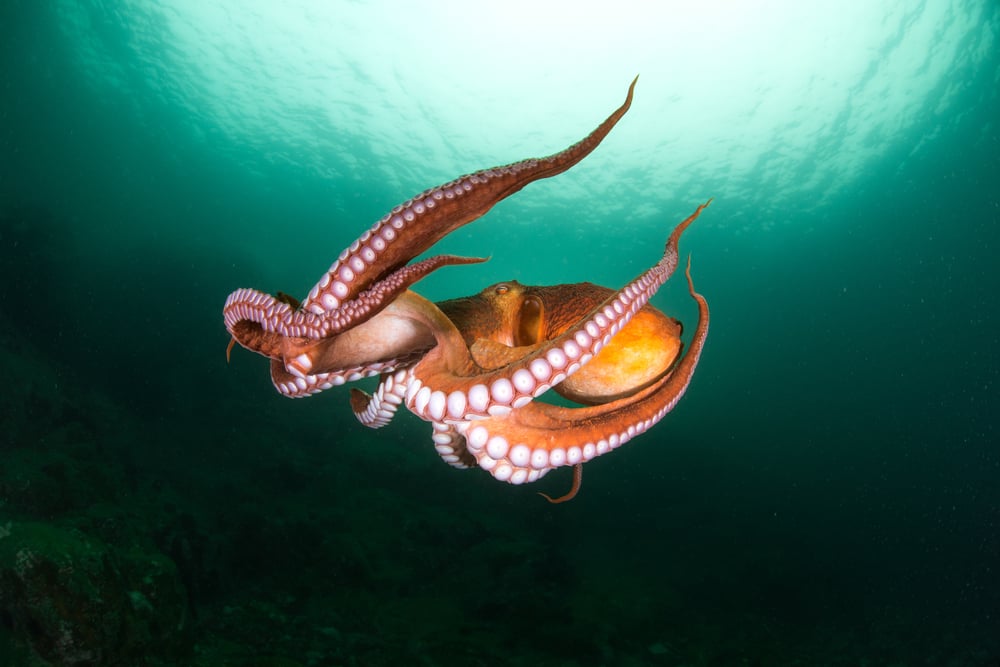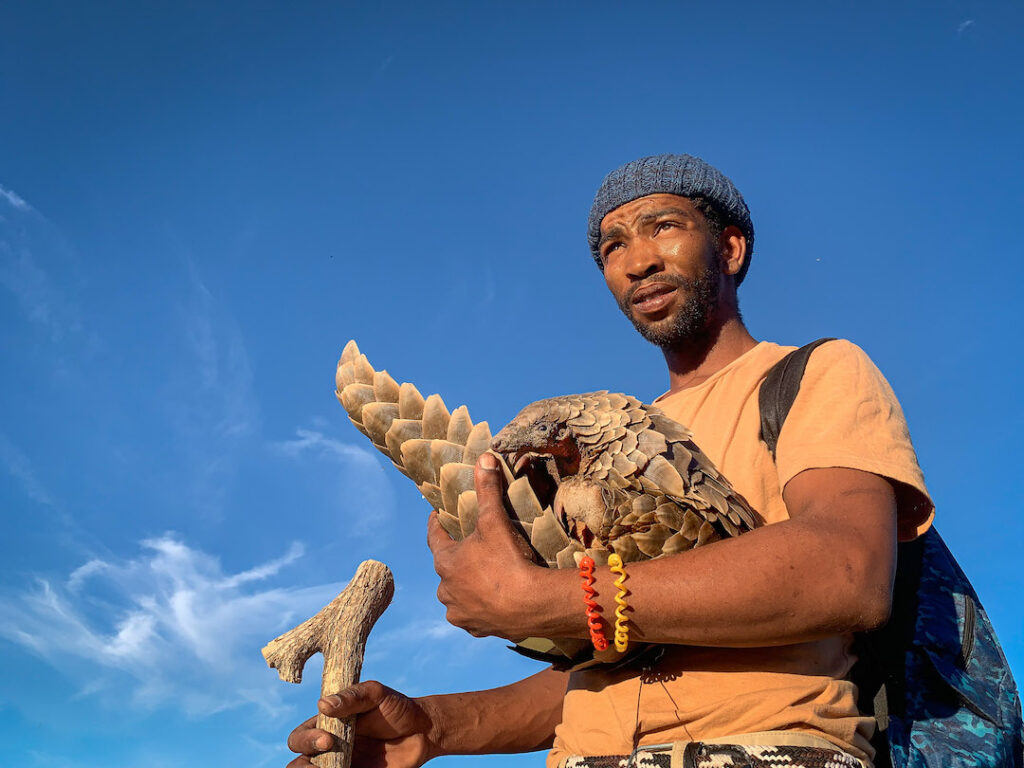The chances are, you’ve never heard of a pangolin. Covered in brown plate-like scales, these termite-eating, elusive mammals walked the earth long before man – 80 million years ago to be precise.
But in the very short time that humans have been around, we have managed to drive pangolins to the precipice of extinction. While ivory and rhino horn trade is a well-documented, bloody, billion-dollar business, it’s estimated that more than one million pangolins have been traded illegally over the last 11 years for their prized meat and scales which many cultures believe wrongly to be a medicine. It is more than elephants and rhinos combined.
Roll Play
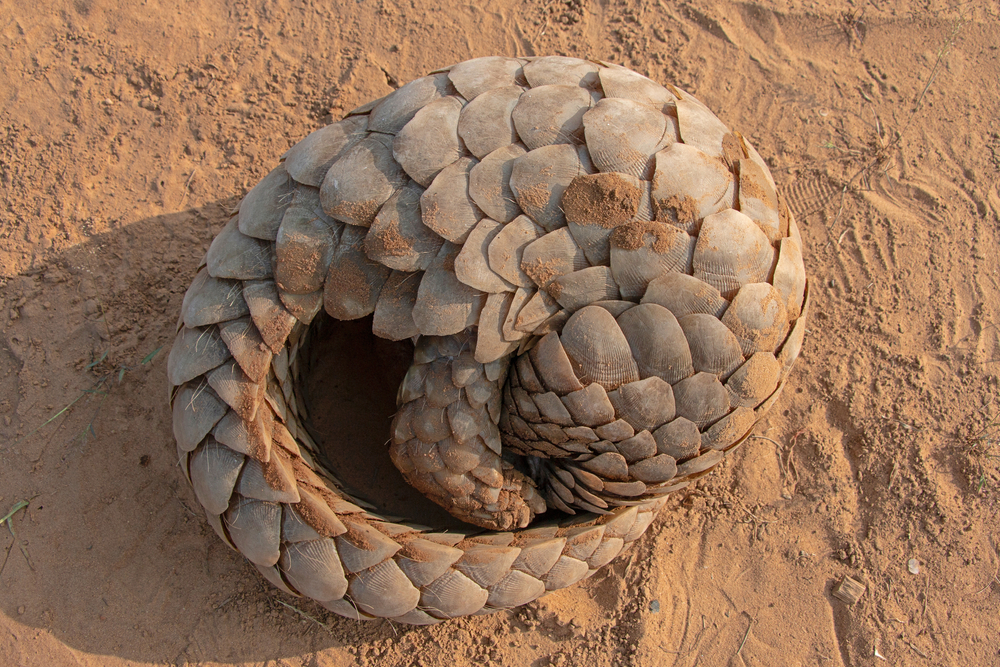
Despite their scaly, reptilian-like appearance, pangolins (nicknamed “walking artichokes”) are actually more closely related to our canine friends than lizards. So unique are these toothless, solitary, nocturnal and almost blind creatures, that they have a mammal order all to themselves called Pholidota.
‘Pangolins are very important in the whole ecosystem that we have… If you lose pangolins you upset all sorts of things but the sheer humanity of not looking after such a beautiful gentle animal as a pangolin breaks my heart’
Sir David Attenborough
Across the eight species distributed across Asia and Africa, Chinese, Philippine, and Sunda pangolins are now filed as Critically Endangered, Indian, Tree and Giant pangolins as Endangered, and Long-tailed and cape pangolins as Vulnerable.
But it’s impossible to say exactly how many of the creatures there are because of their elusive nature. ‘Pangolins are extremely secretive and difficult to spot.,’ says Dr Richard Thomas from the Wildlife Trade monitoring network TRAFFIC. ‘They’re mostly nocturnal and being so elusive means there’s little known about them or their habits.’
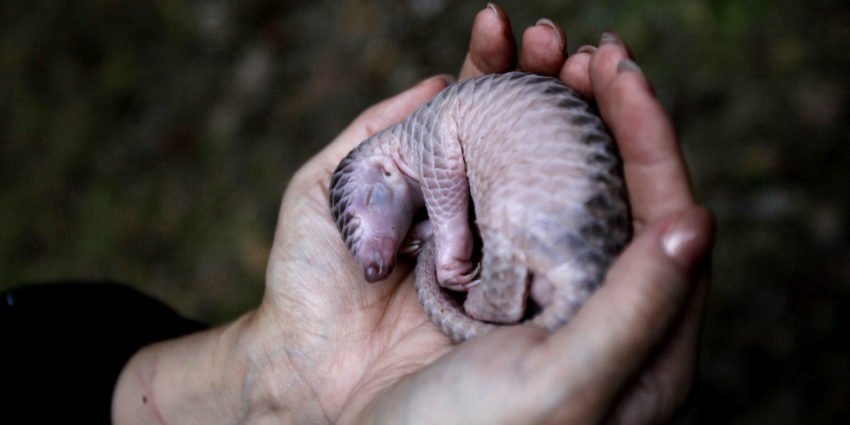
Their name derives from the Malay word penguling, meaning ‘one that rolls up’ – their defensive reflex when threatened. But in a cruel twist of fate, this makes them even more vulnerable to poachers. Kinda Jabi from International Fund for Animal Welfare (IFAW) explains: ‘Their notoriously secretive character is to protect them from other predators.’ But, he explains, this doesn’t work with humans ‘as they are easy to carry even when they roll around themselves in a bid to guard themselves.’
Eaten To Extinction
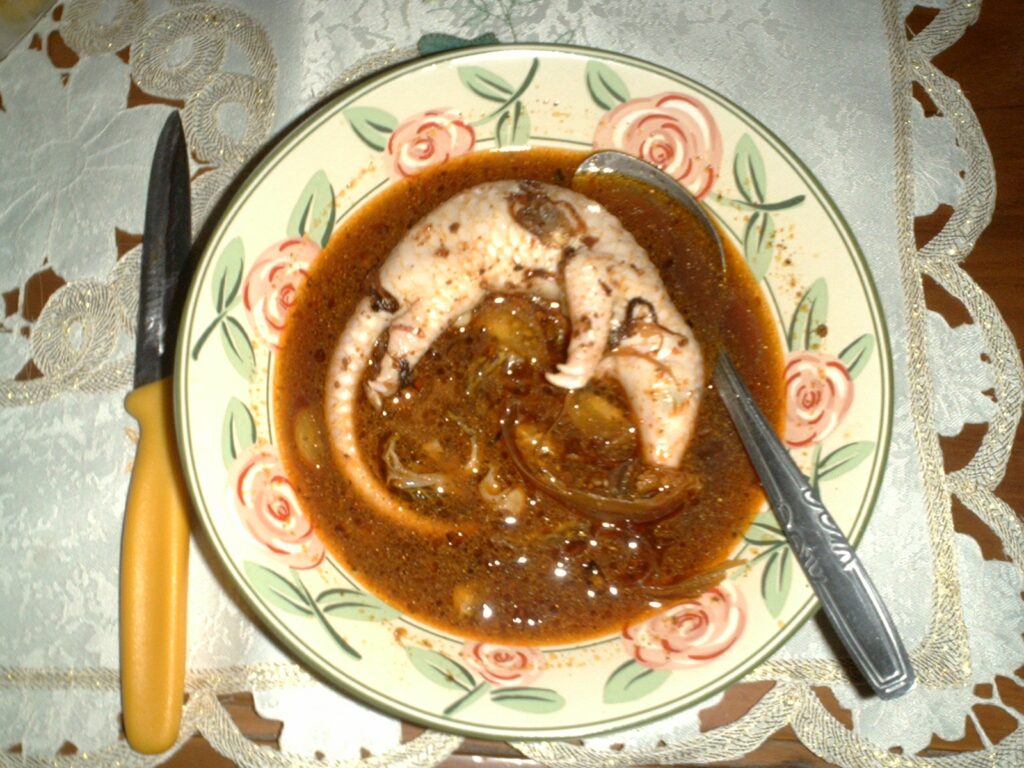
Much like rhino horn and elephant tusks, the black market driving the illegal trade of prized pangolin meat and scales stems from China, where the illegal wildlife trade has become a multi-billion dollar business.
It’s estimated that 100,000 pangolins are captured every year from across Africa and Asia, destined for China and Vietnam – a million of the mammals over the last decade. Despite being a protected animal in China, where their consumption carries a 10-year prison sentence, it’s not uncommon to find pangolin meat on the dinner menu. The cruel trend for slaughtering live pangolins at the table of exclusive restaurants, is deemed a ‘VIP experience’ by the rapidly emerging Chinese middle class, who will pay up to $1,000 for the so-called exotic delicacy.
The value of these scaly creatures has soared due to demand out-stripping supply – in the 1990s pangolins were worth about $14 per kilogram, today they can easily command $600 on the black market. But it’s not just high-end cuisine that is driving the illegal trade – their meat and scales are highly sought after in traditional medicines in Africa and Asia too.
The Chinese traditional medicine (CTM) market alone, consumes around 200,000 pangolins (130 tonnes) annually. Contrary to some beliefs, their keratin-rich scales, made from the same stuff as our hair and fingernails, don’t possess any medicinal benefits. But this doesn’t stop them being ground up and eaten as a purported treatment for asthma, rheumatisms, lactation issues and breast cancer in Asian markets, and consumed as bushmeat called ‘Muti’ or ‘Juju’, in many parts of Africa including Tanzania, Cameroon and The Republic of Congo.
Crime Scenes


New research released by TRAFFIC and the International Union for Conservation of Nature. (IUCN) reveals 23.5 tons of whole, live pangolins, frozen parts and scales were confiscated in 2021. And worryingly, the amount seized represents only a fraction (between 10-20%) of the actual trade.
Trafficked along the same routes as elephant ivory and rhino horn, poachers range from independent trappers to crime syndicates, with some 27 new global trade routes annually used by smugglers, according to IUCN.
‘For pangolins, of the top ten countries and territories involved in most international pangolin trafficking incidents, seven are in Asia, namely China, Vietnam, Malaysia, Hong Kong SAR, Thailand, Lao PDR, and Indonesia,’ Dr Thomas says.Thailand is a major transit hub for trafficking pangolins to other Asian countries, which originate primarily from African countries like Cameroon, Sierra Leone and Uganda.
A ban on their global inter-continental trade took effect last January, when pangolins were finally added to Appendix I of the Convention on International Trade in Endangered Species of Wild Fauna and Flora (CITES). But with one pangolin snatched from the wild every five minutes, is it a case of too little, too late for this shy mammal, and what actions can be taken in the fight against wildlife crime.
With one pangolin snatched from the wild every five minutes, is it a case of too little, too late for this shy mammal, and what actions can be taken in the fight against wildlife crime?
‘Those engaged in pangolin poaching and trafficking need to face a high risk of being caught and convicted and face serious penalties as a consequence,’ Dr Thomas stresses.
The highly mobile nature of smuggling networks known to ship, fly and even parcel up and courier pangolin scales in the mail, is one of the main challenges, that conservation charities like TRAFFIC, are trying to overcome.
The number and scale of pangolin seizures has risen dramatically in recent history. A simple timeline of the biggest busts highlight just how rampant the illegal trade is:
- In June 2016: Authorities in Hong Kong confiscated 4.4 tons of African pangolin scales, valued at $1.25 million, concealed in cargo labeled as plastics
- September 2017: Thai customs confiscated 136 live pangolins and 450kg of pangolin scales, from pick-up trucks, valued at $75,000
- In 2017, the government of Cameroon burned 8 tonnes of confiscated pangolin scales, which works out at around 15000 murdered animals.
- November 2017: The biggest pangolin bust in history was made in China’s Shenzhen port when 13.1 tons of scales, disguised as bags of charcoal, were discovered
- February 2019: Authorities in Malaysia seized more than 27 tonnes of pangolins and their scales – believed to be worth at least £1.6m – in Borneo, in the biggest such haul in the country
Heartbreak and Hope
With illicit hunting flourishing, and an unprecedented culinary and medicinal consumer demand for their meat and scales, what does the future hold for these defenseless creatures?
Unfortunately, pangolins are notoriously difficult to keep alive in captivity, with most wild individuals dying within 200 days due to stress and the inability to adapt to artificial diets.
It seems their fate is entirely dependent on conserving their populations in the wild, which can only happen by tackling trafficking head on. ‘There needs to be better detection of pangolin products in illegal trade, more forensic analysis of crime scenes and of products seized in transit or at destination countries, Dr Thomas says. Although 2017 was a year of heartbreak for confiscated pangolins, it was also one of hope, with their conservation status uplisted – banning all trade. But that seems to have been short lived with pangolins remaining the most trafficked mammal in the world today.
Conservationists agree that swift action is the key to the survival of this relatively unknown species, which sadly doesn’t have time on its side.
For more stories about wildlife conservation go to our Change Section








